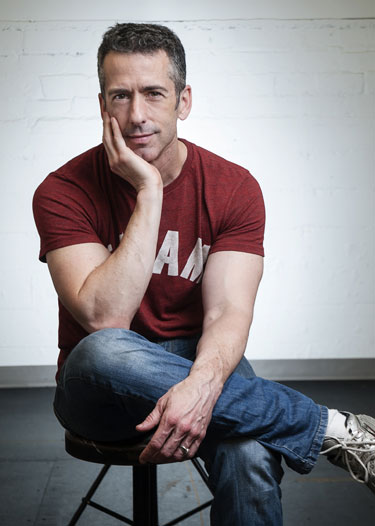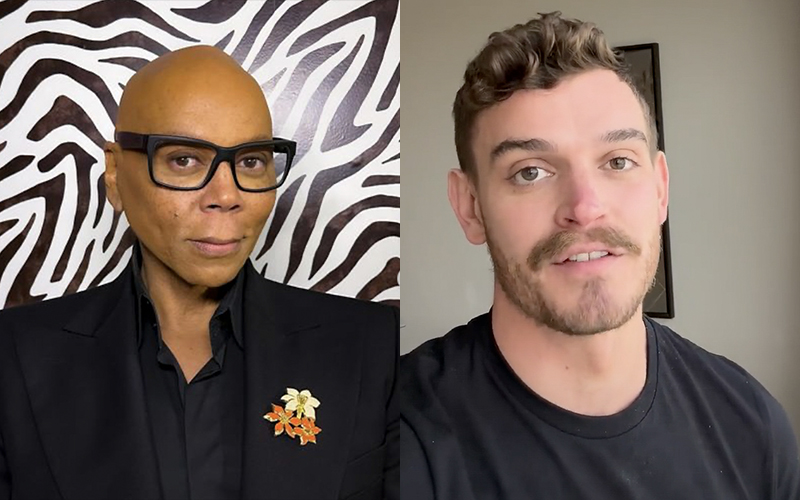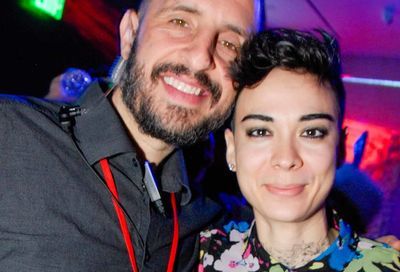Savage Intent
Dan Savage, media's gay enfant terrible, keeps pushing for a more just, sex-positive society
A decade ago Dan Savage irreverently propagated the term ”santorum” as ”the frothy mix of lube and fecal matter that is sometimes the byproduct of anal sex.” The coinage was a jab at Rick Santorum, in response to the former U.S. senator and Republican presidential candidate’s notorious antigay statements, including linking gay sex to bestiality and incest. Even reasonable, usually non-confrontational types couldn’t help but smile at Savage’s efforts, aided and abetted by readers of his nationally syndicated sex advice column ”Savage Love.” And Savage’s definition of ”santorum” remains one of the first results to pop up in a simple search of Google and other online search engines.
But you’d be wrong to think such antagonism is all in a day’s work for the Chicago-born Savage. ”A lot of people think that Savage is a name that I took to write the column,” Savage says. ”But it’s actually my family name. I lucked out.”

Dan Savage
(Photo by LaRae Lobdell)
Ultimately, with a few exceptions, Dan Savage is simply provocative, not hostile. His primary focus, from his early work in the theater to the It Gets Better Project he started with his husband Terry Miller, is to connect people through the critical values of love, respect and honesty.
Savage started writing ”Savage Love” 22 years ago in The Stranger, the Seattle alternative newsweekly started by a co-founder of The Onion and for which the Seattle-based Savage now serves as editorial director. ”I’ve always described the column, and the podcast now, as a conversation I’m having with my friends about sex,” he explains. In doing so for the past two decades, Savage has arguably become contemporary America’s most famous advocate for sex — a new generation’s Dr. Ruth-meets-Dear Abby. He’s helped push society to become a safer, more welcoming place for gays and ”kinksters” by advocating for more honesty ”about what people are actually doing in bed,” rather than ”everyone in public giving lip service to the ideal” of monogamy. In fact, Savage has also coined the term ”monogamish” to define relationships, including his own, that ”occasionally have three-ways or whatever [but are] much more monogamous than not.”
Savage appears at D.C.’s Jewish Literary Festival on Saturday, Oct. 12, one day after National Coming Out Day. And Savage does see his work as a natural extension of the original push for coming out as LGBT. ”You see more and more people speaking up and speaking out,” he says. ”And we blazed that trail for the pot-smoking, kinky, non-monogamous straight people.”
METRO WEEKLY: The primary reason we’re talking today is because you have a new book, American Savage: Insights, Slights, and Fights on Faith, Sex, Love, and Politics, which you’ll be talking about at the Jewish Literary Festival. Just what is your connection to Jewish literature?
DAN SAVAGE: [Laughs.] I don’t know! One of my first boyfriends was Jewish, so maybe the Jewish DNA I scarfed down in my teens has left a lasting imprint.
MW: Does your new book touch on anything Jewish?
SAVAGE: I talk about my Catholicism a lot in the new book. I’m not a believer, and I haven’t been for a long time. But I describe Catholicism as a virus that can lay dormant in your body for so long, you forget you were ever infected. And then all of a sudden it can come roaring back, which it did after my mother’s death.
I write about embracing my identity as a cultural Catholic — I feel culturally Catholic — and it was my Jewish friends who helped me get there. It was while watching people I knew and loved, really good friends and folks at work, who didn’t believe that there was a god, and weren’t hanging out impatiently waiting for the Messiah to show up for dinner, but get together and celebrate the holidays, do Yom Kippur and Rosh Hashanah and affirm their cultural identity as Jews. And watching my non-believer Jewish friends embrace their cultural identities as Jews without having to embrace any of the dogma or baggage or the beliefs in imaginary sky friends helped me tiptoe back to my kind of Catholic cultural identity.
MW: On the topic of being a cultural Catholic, Mark Oppenheimer wrote an essay a couple years ago in The New York Times about how your Catholicism in many respects has really influenced your work. Do you think that’s true?
SAVAGE: I was immersed in Catholicism as a child. My dad was a Catholic deacon, my mom was a Catholic lay minister. An ex-nun came and lived with us when she fled the convent for a little while when I was a kid. I worked at the rectory at St. Jerome’s. I went to a preparatory seminary for high school. So I would have had to have been a ”bubble boy” with headphones on to avoid having the Catholicism that I was steeped in as a child impact my writing or my worldview. That’s the place I started. A lot of religious people hate me — hate my writing, hate what I do, hate what I say. But if you took all of my sex-advice columns, 20 years’ worth, and you boiled them all down to their absolute essence, any honest reader knows or would admit or be able to recognize that what you’re left with is: Do unto others as you would have them do unto you. With my definition of ”do unto” and what’s being ”done unto” being a bit broader than other people’s definitions. The columns are usually about how to treat people well, how to demand decent treatment, how to meet needs or get your needs met.
When I sign-off on infidelity occasionally — or give people a permission slip — it’s always when infidelity is the lesser evil. Not like, just go for it and cheat, cheat, cheat. But if you’re faced with an impossible choice between two awful things, there are times when the cheating is the lesser sin, and in those instances I do give my permission slip. Which then causes religious people to say, ”Oh my God, he’s pro-adultery.” And it’s like, well, I’m pro-situational ethics. I’m pro-accommodation. I’m pro-realism/being realistic. And usually when I’m pro-adultery, I’m being anti-divorce, for which I get no credit from religious people who are also anti-divorce. [Laughs.]
Support Metro Weekly’s Journalism
These are challenging times for news organizations. And yet it’s crucial we stay active and provide vital resources and information to both our local readers and the world. So won’t you please take a moment and consider supporting Metro Weekly with a membership? For as little as $5 a month, you can help ensure Metro Weekly magazine and MetroWeekly.com remain free, viable resources as we provide the best, most diverse, culturally-resonant LGBTQ coverage in both the D.C. region and around the world. Memberships come with exclusive perks and discounts, your own personal digital delivery of each week’s magazine (and an archive), access to our Member's Lounge when it launches this fall, and exclusive members-only items like Metro Weekly Membership Mugs and Tote Bags! Check out all our membership levels here and please join us today!























